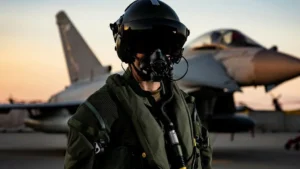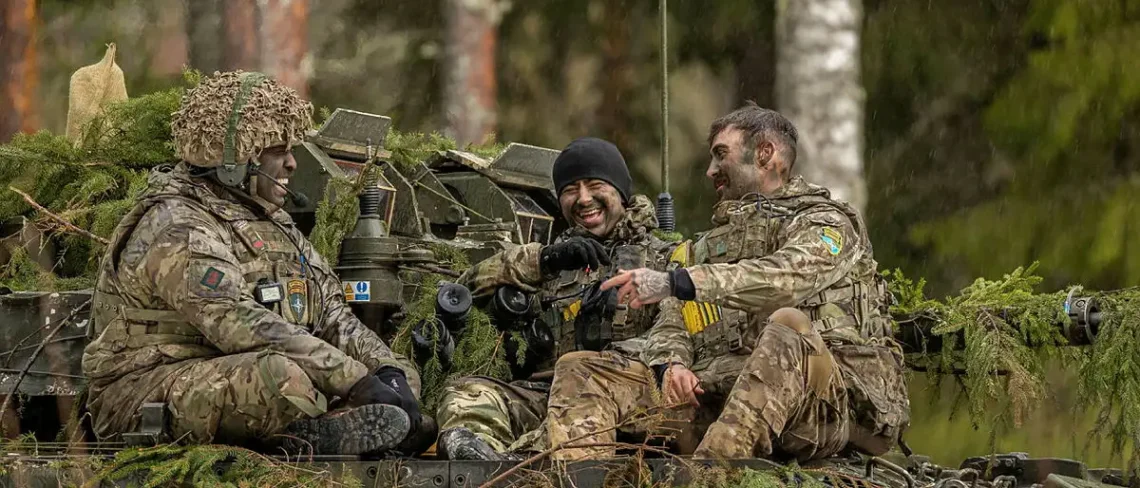The most important task of a state is to protect the country from external attack.
But in all of these categories, the British Armed Forces now have shortfalls. The number of soldiers has fallen dramatically, and worse still, all the indications are that the problem will only get worse.
The British Army will soon have 153 Challenger 3 tanks at its disposal, only slightly more than the 134 owned by Switzerland, a neutral country that has not fought a war since 1847, according to The Telegraph.
There are around 9 million people living in Switzerland, compared to almost 70 million in the UK.
More and more Brits are hanging up their uniforms. As a result, virtually every infantry regiment in the British Army is understaffed and the Royal Navy is having to dock warships due to staff shortages.
Even the legendary Royal Air Force is struggling with recruitment. This suggests that the revelation that the RAF illegally discriminated against white male applicants in favour of women and ethnic minorities – a symbol of the Armed Forces’ obsession with diversity – isn’t exactly attracting the kind of elite you need to fly fighter jets, for example.

The RAF discriminated against white trainee pilots in favour of women and people with the right skin colour, apparently because diversity is more important than combat capability. Photo: UK MoD
The similarities to the crisis in the US military are striking. Go woke, go broke, they say. But here it’s worse: Go woke, go dead.
In Norway, too, the Armed Forces are prioritising Pride celebrations and gender counsellors. Old officers are tearing at their stubble.
General Sir David Richards, a prominent former chief of defence staff, tells The Telegraph that the armed forces are now in a “miserable state”.
– What [historically] distinguishes the British Armed Forces from most, if not all, other armed forces is the quality and motivation of the people who work there.
– Equipment means little if the Navy, Army and Air Force cannot attract and retain their fair share of the best people our nation has to offer. Today, that critical mass of quality is hanging by a thread. The world is in a dangerous state. The armed forces are in a miserable state.
This is a trend across the West: Huge sums are being spent on aid, immigration and climate measures, while at the same time billions are being poured down the drain in Ukraine.
Helping Ukraine initially had massive support, but when Europeans themselves are struggling to make ends meet, while the state fails in its most important tasks, commitment to foreign countries declines.
Military personnel are leaving the Armed Forces at an alarming rate, despite a six per cent pay rise this summer. 15,119 resigned in the year to October. Of these, 7,778 were counted as “voluntary leavers”, meaning they chose to leave of their own free will.
In the same period, the recruitment of around 12,000 new soldiers stopped. This creates a twofold problem:
Firstly, the number of soldiers drops by around 3,000. Secondly, experienced soldiers are being replaced by brand new recruits. Defence Minister John Healey expects the trend to be at least as negative next year.
Recruitment targets are not being met, this happens every year. Service morale has fallen to a record low. In addition, over 13,000 soldiers are now reported to be unfit to serve for medical reasons.
General Sir Richard Dannatt, former head of the British Army, believes that the shortage of soldiers has led many military personnel to feel that they do not constitute a true fighting force.
– Experienced officers and senior non-commissioned officers don’t like being in an organisation that is clearly under-invested.
– Operating with old or inappropriate equipment is highly demotivating. Similarly, they know that the British Army cannot fulfil the government’s objective of providing a fully-fledged, war-fighting force. They feel that they are now part of an ill-equipped gendarmerie.
In the past, a soldier serving for extended periods could expect to experience exercises and deployments in a number of different countries on several continents, even in peacetime. This attracts young, adventurous people.
But cutbacks have greatly reduced such opportunities. The government is spending taxpayers’ money on other things that certainly don’t benefit British soldiers (or anyone else〉.
Why would you go through rigorous training and sacrifice contact with friends and family to protect your country, when the country’s borders are wide open to the worst enemies?
Most Brits don’t choose the life of a soldier to fight in Afghanistan, Iraq or Ukraine, areas and countries that are essentially of no interest to the UK.
Many soldiers may be prepared to take the tough option, but their partners are understandably not. That’s why many soldiers vote with their feet and choose civilian life.
All three branches of defence also have to deal with the changing demands of Generation Z recruits, who require double beds, private bathrooms and WiFi in the barracks.
In addition, many are alarmed by how soldiers who have made mistakes in war situations are sent to court, accused of murder and risk severe penalties.
While warmongers seem to be dreaming of a war with Russia, military capabilities are crumbling across much of Europe and the US.
At the same time, China is mobilising on the sidelines as it quietly watches the West destroy itself.
This is how a civilization dies.


